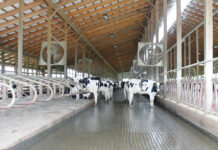SALEM, Ohio – Bovine spongiform encephalopathy, or BSE, is a progressive neurological disease among cattle that is always fatal.
It belongs to a family of diseases known as transmissible spongiform encephalopathies. The disease is caused by a self-replicating protein, or prion.
Human connection? Also included in that family of illnesses is the human disease, variant Creutzfeldt-Jakob Disease (vCJD), which is believed to be caused by eating neural tissue, such as brain and spinal cord, from BSE-affected cattle.
The only case of vCJD in the United States reported to the Centers for Disease Control in 2002 involved a 22-year-old Florida resident who was born in and grew up in the United Kingdom.
According to the centers, it is likely that this patient was exposed to the BSE agent one or more times before moving to the United States.
The disease is not spread by usual personal contact.
Feed ban firewall. The only way BSE spreads is through contaminated feed.
The United States banned imports of cattle and bovine products from countries with BSE beginning in 1989.
In 1997, the U.S. Food & Drug Administration instituted a ban on feeding ruminant-derived meat and bone meal supplements to cattle. The ban serves a firewall to prevents the spread of BSE to other animals.
Worldwide, there have been more than 180,000 cases since the disease was first diagnosed in 1986 in Great Britain. More than 95 percent of all BSE cases have occurred in the United Kingdom. The outbreak peaked in 1993.
Clinical signs. BSE affects older cattle, typically over 30 months of age.
Affected animals may display changes in temperament, such as nervousness or aggression; abnormal posture; incoordination and difficulty in rising; decreased milk production; or loss of body condition despite continued appetite.
There is no treatment.
The incubation period ranges from two to eight years.
Source: USDA Animal and Plant Health Inspection Service
Centers for Disease Control
Get 4 Weeks of Farm and Dairy Home Delivered









